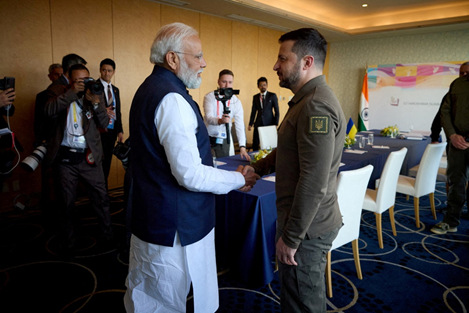SIGNIFICANCE OF PRIME MINISTER MODI’S VISIT TO KYIV
Why in the News?
Prime Minister Narendra Modi’s upcoming visit to Kyiv marks a significant shift in India’s foreign policy, highlighting India’s evolving stance on the Ukraine-Russia conflict and its implications for global diplomacy. Historically, India has maintained a balanced approach towards the conflict, focusing on neutrality and dialogue. However, this visit signals a potential recalibration of India’s foreign policy, with broader implications for its engagement with Europe, Russia, and the West.
Source :Reuters
| Key Aspects of Modi’s Visit to Kyiv:
Symbolic Break from Neutrality:
Reaffirmation of India’s Strategic Autonomy:
Strengthening Ties with Europe:
Impact on India-Russia Relations:
India’s Role in Global Peace and Stability:
|
| Broader Implications for India’s Foreign Policy:
Balancing Act Between Major Powers: India’s engagement with both Russia and Ukraine showcases its diplomatic balancing act in an increasingly polarized world. Maintaining good relations with Russia while engaging with Ukraine and the West reflects India’s nuanced approach to international relations, avoiding taking sides while advocating for peace and stability. Implications for Indo-Pacific Strategy: India’s active engagement in European conflicts, such as the Ukraine crisis, could influence its role in the Indo-Pacific region. Strengthening ties with Europe might lead to increased cooperation on issues of mutual interest, such as maritime security, counter-terrorism, and maintaining a rules-based international order in the Indo-Pacific. Economic and Security Cooperation: Closer ties with Ukraine and Europe can lead to increased economic cooperation, particularly in technology, defense, and energy sectors. Europe’s expertise in green technology and renewable energy can complement India’s energy transition goals, while defense cooperation can enhance India’s military capabilities. India’s Position on Global Issues: Modi’s visit to Kyiv also reflects India’s proactive stance on global issues, positioning itself as a key player in international diplomacy. This approach can enhance India’s role in multilateral forums such as the United Nations, where India has consistently advocated for reforms and a greater say for developing countries. |
Conclusion
For UPSC aspirants, understanding the significance of Prime Minister Modi’s visit to Kyiv provides valuable insights into the evolving dynamics of India’s foreign policy. This visit is not just about Ukraine; it reflects broader strategic considerations involving India’s relations with Europe, Russia, and the global order. It underscores the importance of strategic autonomy, diplomatic engagement, and the pursuit of national interests in a complex international environment. Aspirants must appreciate the multifaceted nature of international relations, where economic, strategic, and diplomatic considerations intertwine, shaping a nation’s foreign policy. India’s approach to the Ukraine crisis exemplifies its ability to navigate complex global challenges while upholding its values of peace, stability, and cooperation.




